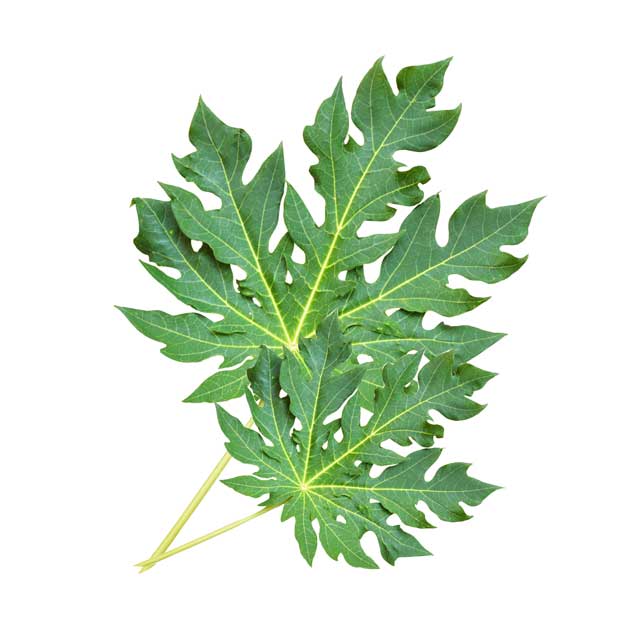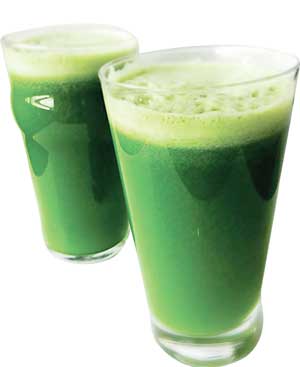Reply To:
Name - Reply Comment

Sri Lanka is no exception where, dengue infection is a priority for the national health services for prevention and reducing mortality. In desperation, many people have resorted to use papaya leaf extract covertly
What is this hullabaloo, to say it in colloquial terms about eating leaves. Did Dr. Rohan Wijekoon say the leaves should be eaten raw - No. He wanted the tender leaves cooked or in a form that is eatable. There is nothing wrong, because according to my grandmother, during the 1800’s severe drought, the yams of water lillies were boiled and then tied around the waste and then when they were hungry, these boiled yams were eaten

Over the years leaves have been part and parcel of the life of rural Sri Lanka. There were Home gardens in practical every home in rural areas and they partook the leafy vegetables from these gardens. Even manioc leaves are dried for a day and then cooked for a meal. They have been used as medicinal herbs as well. So we now come to Papaya tested out now as a remedy for Dengue.
There is now an on-going investigation on leaf extract from fresh Papaya for hematological parameters and toxicological changes for treating Dengue.

This question was touched at a “ Workshop on Dengue “ organized by the Faculty of Medicine, Peradeniya. This was in collaboration with ‘ Centre of Research in Tropical Medicine “.
For two hours experts in the area of Dengue spoke at the Senate Room of the University of Peradeniya. Their opinion was that Dengue would have in most people, but it is the serious ones that has come out into the open.The speakers were Dr. R.M. Abeyratne, Professor Ms.F. Noordeen, Dr. Udaya Ralapanawa, Professor Ananda Jayasinghe and Dr. R.M. Mudiyanse.
In 2016, there had been 54,945 cases reported while only 75 have died. It was pointed out that most would be having the disease and would have overcome even without their knowledge. Professor Ms.F. Nordeen spoke on the research conducted and that this has been conducted on Dengue at the Faculty of Medicine in the University.
The research on Papaya extract was carried out by a team, Sinhalagoda Lekamlege, Chandi Asoka, Dharmaratne, Susiji Wickramasinghe, Roshia Waduge, Jayanthi Rajapakse, and Senanayake Kularatne.
The study was to evaluate the effect of hematological, biochemical and toxicology changes in mice after the administration of papaya leaf extract, as one of medicinal plants which has been used worldwide as a remedy food, cosmetic and widely cultivated around the world.
People in rural areas have used papaya leaf, as an alternative to treat dengue and dengue haemorrhagic fever. They believe this plant’s leaves can increase the platelet level of dengue patients shortly after receiving juice boiled or raw of the leaves, says the researchers.
The researchers in their comments say that it is an interesting study of the effect of papaya leaf extracts. The finding are also impressive, they add, would be useful for continuous study related to papaya leaf, which could be an alternative to treat dengue and malaria fever instead of prescription drugs.
The Papaya plant is laltiferous as it contains specialized cells known as lactifers that occur in most tissues and secrete latex. Lactifiers secrete latex and are dispersed throughout most plant tissues. The Papaya-latex is well known for being a rich source of the four cysteine endopeptidases namely papain, chymopapain, glycyl endopeptidase and caricain. Leaves contain an alkaloid called carpaine and a glucoside named carposide. Different parts of the papaya plants including fruit, dried fruit, leaves, dried leaves, stems, seeds and roots have long been used as ingredients in alternative medicine. For instance, the seeds are used for expelling worms and roots and seeds are used as an abortifacient agent. The leaves (especially fallen ones) are used variously for the treatment of fevers, pyrexia, diabetes, gonorrhea, syphilis, inflammation and as a dressing for septic wounds.
Untested herbal medicines could be potentially injurious to human health. Many plants used in traditional and folk medicines are potentially toxic, mutagenic, and carcinogenic. Toxicological studies of extracts from different parts of papaya plants such as seeds, fruit, roots and leaves have been carried out using several animal models. Acute and chronic toxicities of unripe fruit of the C.papaya have been documented. Some of the traditional claims of efficacy that have been investigated scientifically using animal models and their efficacy have been proven. Recent studies showed that C.papaya leaf extract has potential anti- sickling (inhibition of sickle cell formation) properties. Indran et al. have shown that there is a protective effect against gastric ulcers in rats. Moreover, C.papaya flowers are known to have antibacterial activities[15]. The contraceptive efficacy of the seeds of C.papaya has been earlier demonstrated in rats, mice and rabbits. Oral administration of C.papaya seed extract could induce reversible male infertility and could be used for pharmaceutical development of a male contraceptive.
Today, the researchers say, many tropical and subtropical countries are engulfed by dengue infection which is caused by viruses belonging to the Flaviviridae family. There is no specific therapy for dengue even though the infection has a significant mortality. Sri Lanka is no exception where, dengue infection is a priority for the national health services for prevention and reducing mortality. In desperation, many people have resorted to use papaya leaf extract covertly. This is applicable even to hospitalized dengue patients. However, recommending C. papaya leaf extract for dengue infection is unethical until it is proven by scientific research. Therefore, in the present study, we have investigated the effects of oral intake of pure extract of C. papaya leaves on haematological/biochemical parameters and toxicological changes in the murine model. 2. Materials and methods 2.1. Experimental animals Male white mice (average body weight 32-33 g) 6 weeks old, obtained from the Medical Research Institute, Sri Lanka were used as the model for haematological and toxicological investigation.
Animals were kept in the animal house of the Faculty of Medicine, University of Peradeniya. Three experimental trials were conducted during May 2011 to May 2012 using three sets of mice. Mice were divided into two groups, control and test, in all three trials. For the first and second trials, we used 48 mice (for each trial 12 mice/ control and 12 mice/test) and for the third trial, 36 mice were used (18 control and 18 test). All mice were given a standard commercial diet with free access to water. All mice in both test and control groups were numbered by ear tattooing. The first trial was a pilot study to plan a proper study where the following variables were considered-dose of C. papaya leaf extract, timing of blood sampling and histopathological changes in liver. The second trial refined the methodology and the third provided the results presented here. Ethical clearance was obtained from the Ethical Review Committee of the Faculty of Veterinary Medicine and Animal Science, University of Peradeniya, Sri Lanka.
The research is ongoing at the Faculty of Medicine and Veterinary Science of the University of Peradeniya on Dengue.